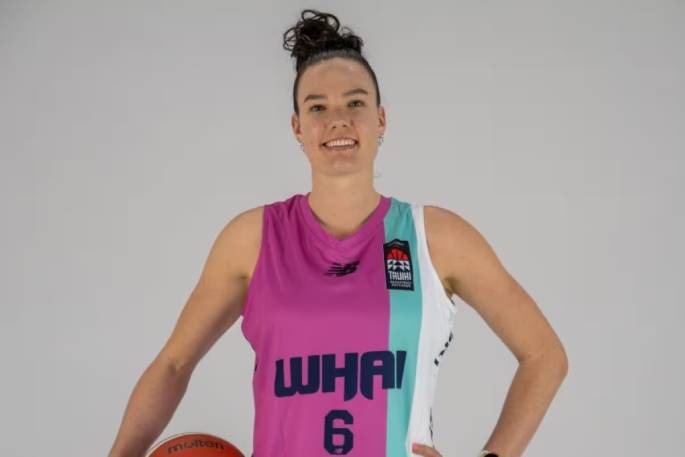Lara McSpadden hasn’t let diabetes stop her from doing what she loves most — playing basketball.
Coming to New Zealand from Australia as an import for the 2024 Tauihi women’s professional league season, Tauranga Whai centre McSpadden is one of the league’s leaders in second-chance points, defensive rebounds and overall rebounds.
She was diagnosed with type 1 diabetes in 2006 when she was 7 and got into playing basketball at the age of 12, debuting professionally in 2016.
Now 25, McSpadden has played WNBL in Australia throughout her professional career and, before coming to New Zealand, played four years in Sydney and three in Townsville.
When deciding to play in the Tauihi League in New Zealand, McSpadden said she was looking for a change, a fresh start and something different.
“I was kind of at that stage where I wanted to travel and be able to do other things while still playing basketball.
“I’m at the end of my degree now, so I can kind of afford to focus on other things,” McSpadden said.
As a professional, high-performing athlete, McSpadden’s type 1 diabetes diagnosis has meant changes in her decision-making approach to games and the need to be proactive.
 Lara McSpadden, who had lived in Newcastle, Australia all her life, has been playing professionally since 2016 in the WNBL but came to New Zealand looking for something different.
Lara McSpadden, who had lived in Newcastle, Australia all her life, has been playing professionally since 2016 in the WNBL but came to New Zealand looking for something different.
Type 1 diabetes is caused by the immune system turning on itself, destroying beta cells within the pancreas and removing the body’s ability to produce insulin.
Without insulin, the body starves as it can no longer process food and sugar builds up within the bloodstream in life-threatening amounts.
The Junior Diabetes Research Foundation said type 1 diabetes affected 26,000 people in New Zealand.
Keeping up with physical activity, like professional basketball, can be a challenge for diabetes management.
“You have to make decisions 24 hours in advance,” McSpadden said.
“The insulin I give sets a trend for what will happen in the next 24 hours, so that is a big thing when thinking about, most importantly, games, and training as well.
“Getting into a routine is important to help the predictability of my blood sugar levels.”
She said one of the hardest parts was knowing what she could eat and when she could eat around sports.
“I’m always making sure I’m checking my sugar levels at every opportunity I can.
“An hour before a game, then halfway through the warm-up, then halftime, end of the game, just whenever and then wherever I feel like I need to.”
McSpadden said there was a difference in how her blood sugar levels are managed when approaching a game, as against training.
“Games for me, I guess, are different. I get a lot more nervous with the adrenalin, so that kind of sends me a bit higher in my range.
 Lara McSpadden said diabetes doesn't stop her doing what she loves and she wants others to know there are people who care and want them to succeed regardless of any adversities they face.
Lara McSpadden said diabetes doesn't stop her doing what she loves and she wants others to know there are people who care and want them to succeed regardless of any adversities they face.
“Whereas trainings aren’t as nerve-wracking, so my levels are a bit more stable throughout training.”
McSpadden said she could feel fatigued when her blood sugar was low.
“My tongue gets tingly, and sometimes I can’t catch the ball.
Her co-ordination deteriorated when her blood sugar was high.
“I just can’t concentrate, so there’s definitely a balance between the two.”
McSpadden had to make sure she had all her medication when she came to New Zealand because the insulin she needed was not available here.
“That’s probably the hardest part but I’ve been really lucky. All the teams I’ve played on have been very supportive and want to know what they can do to help me.”
She said communicating well with coaches and teammates was the most important thing.
“I’m in touch with my diabetes doctor all the time, she’s very supportive, and my mum and dad always check in on me as well,” McSpadden said.
McSpadden believed dealing with diabetes as an athlete was just another challenge to conquer, and it did not mean diabetes would prevent her from doing what she wanted to.
She had a message for girls in sports who may be going through something similar.
“Look after yourself and don’t let it stop you.
“There are people who care for you and will still want you to succeed at what you want to do.
“They will care for you in a way that’s going to make it happen.”



0 comments
Leave a Comment
You must be logged in to make a comment.